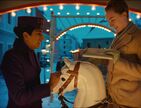Wes Anderson's style is very distinctive. Whether it’s an animated film such as "The Great Fox Papa" or a live-action movie such as "The Kingdom of Moonrise", it is always fixed-camera and simple panning, with few complicated and fancy lifting shots, so that the audience can focus on He carefully composes and tones. The composition is always paper-cut and symmetrical, the tone is always fairytale-like exaggeration and fullness, the characters always have only the front and back or the side of exactly 90 degrees, the behavior is mechanically exaggerated, the motivation is simple and direct, in other words, "2D", full of cartoon flavor, and with With a little cold humor.
"Budapest Hotel" takes this style to its extreme, and all kinds of humor are like the grandson of the old writer who made trouble at the beginning. Needless to say, the singing sounded in the bathroom during the conversation. You may not know that the famous painting "Boys and Apples" that has been repeatedly contested was fabricated based on real models by a painter hired by the director.
In addition, there are many compact and exciting plots and action scenes that are surprising. For example, the super-complex escape process, thrilling and cartoonish humor complement each other; the ski chase scenes and the gunfights in the hotel are as evocative as the red-and-white video games of the last century.
More importantly, the "Budapest Hotel" vividly portrays Mr. Gustav's image and his story, remembering the passing of the European aristocratic world, especially the decline of the spirit and elegance of that world.
Mr. Gustav, presented to us by "British Patient" Ralph Fiennes, has extremely exquisite lines, extremely classical words, and extremely rich details, to the point of babbling. Whether it is a tryst with a lover, a villain on a death row, or when his life is hanging for a moment, he always loves to read poems to express his emotions, even if no one is listening. No matter when and where, even if you are a prisoner, you can't miss the L'Air de Panache perfume, so you don't hesitate to expose your whereabouts. A vivid and proud aristocratic style. In fact, he is not a nobleman, he is just a servant of the nobleman, butler of the Budapest Grand Hotel. His aristocratic style is naturally a necessary quality to serve the aristocracy, and it is also a microcosm of the dead classical Europe.
This film is not to be superior to the nobles. At least by today’s standards, Mr. Gustav’s emotional footsteps on N boats are also very fickle (just decided to guard the painting forever, and then wanted to sell it), his hierarchical concept is deeply rooted and he treats Subordinates are also more mean. And the ladies in his arms, insecure, vanity, superficial, blonde, needy, not to mention the insatiable children and relatives of the old ladies, they are not a positive image.
However, no matter how stupid and corrupt the aristocracy is, in feudal Europe, the aristocracy has always been the pressure relief valve and buffer zone between classes. The decentralization of the nobility directly avoided large-scale movements and disasters brought about by a high degree of centralization. The personal defects of the nobility were completely innocuous in the face of the full-scale industrialization, centralization, and populist fanaticism that rose in Europe in the 20th century.
The incarnation of industrialization, centralization, and populist fanaticism is the Nazi. The First World War physically wiped out a large number of European aristocrats. The unequal international relations and the Great Depression after the war allowed the Nazis to take advantage of the void and occupy the void left by the European aristocracy. In addition to the very obvious change of "SS" to "ZZ" military uniforms, there are many Nazi miniatures in this film. Dimitri, played by Adrian Brody, is insatiable, cruel and ruthless, and often roars, it is Hitler's reincarnation; his thug (William Dafoe) is unsmiling, leather-clothed motorcycle, murderous, unblinking, a living SS image ; The police officer played by Edward Norton has the old friendship of aristocratic parents and Mr. Gustav, but was later forced to serve the Nazis. (Of course, looking back in this corner is the director’s typical evil taste)
The remaining nobles were either murdered by their own sons, or simply took refuge in the Nazis. Only Mr. Gustav, with tired elegance and uncompromising pride, was struggling to maintain the last dignity of the world he belonged to until Was ruthlessly swallowed by a frenetic extreme wave. At the climax of the film, the chaotic gunfight in the hotel with various military uniforms and various weapons symbolizes the Second World War.
"His world had disappeared long before he entered, but he has maintained that illusion brilliantly." It is a perfect summary of Mr. Gustav, and it is also the melancholy and sadness rippling in the already depressed and deserted Budapest Grand Hotel. The beginning and the end of the movie are very complicated. From the beginning, the audience is deliberately reminded of the video resolution to indicate that this is a movie. In addition, the reader girl, the writer with grandson, and the writer’s interviews with the elderly Zero, layered narratives. , Is to show that Mr. Gustav and the era he represents are far away from us, but his story will be passed on forever.
At the same time, there is always light in the darkness. Zero, a doorman from a foreign land, survived the war alone, fleeing to this point, without a name. With loyalty, diligence, and cleverness, he got everything he deserves, and he also gained love across races. He symbolizes the exploration and struggle of the grassroots, and will be the hope of reviving the world after the collapse of the old order.
WeChat public account: feidudumovie (feidudumovie)
View more about The Grand Budapest Hotel reviews











